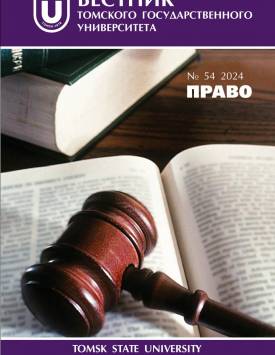Constitutional jurisprudence of values: an attempt on the purity of law?
The use of different arguments and grounds for interpreting legal norms can be considered in relation to the text of legal documents within the framework of three approaches. Textualism limits interpretation to the literal content of the text itself. Meta-textualism relies on the general context of the textual fixation of the norm - the history of its adoption and law enforcement interpretation, systemic interrelations with other norms, the implied goals of legal regulation, etc. The meta-textualism is based on the general context of the textual fixation of the norm. Extra-textualism is based on the assessment of economic, political and other social consequences of the implementation of the norm. The latter is perceived in legal theory as a threat to the autonomy and purity of law, a threat to its certainty, sacrificed to political or other immediate interests. The author questions the place of value analysis in these three approaches, asking, in response to the criticism of value jurisprudence in the academic literature, whether such value analysis threatens the autonomy of law in favour of subjective and arbitrary grounds for decision-making. Despite the distinction traditionally made in science between norms and values, there is a clear relationship between them. If the formal basis of legal norms is the authority to give them legal force, and lower-level norms must comply with more general legal prescriptions, the social content of legal norms is not explained in the formal plane. Meanwhile, any norm is oriented to a certain social result, which is the purpose of its adoption, and its content is best described through the indication of the value, the realisation and protection of which the norm is aimed at. The involvement of value analysis in the mechanism of norm interpretation shows the consequences of choosing between competing norms or selecting a particular option of norm interpretation. The advantages and merits of the value-based approach can be fully developed under the conditions of an explicit declaration of those values that are realised in a particular decision of the legislator or the court. This declaration can create the value certainty that is required by the nature and basic principles of law. In addition, value analysis requires the dogmatisation of values, i.e. the disclosure of their content and mechanisms of realisation in legal norms, which, in particular, should provide an answer to the question of which values are incompatible with the basic principles of law and cannot be realised in legal norms. This answer should neither excessively narrow nor unjustifiably expand the limits of the value content of law, preserving its sociocultural universality, but protecting the fundamental values of law itself. The author declares no conflicts of interests.
Keywords
constitutional values, values of law, teleological interpretation of legal norms, norms and valuesAuthors
| Name | Organization | |
| Belov Sergey A. | St. Petersburg State University | s.a.belov@spbu.ru |
References

Constitutional jurisprudence of values: an attempt on the purity of law? | Tomsk State University Journal of Law. 2024. № 54. DOI: 10.17223/22253513/54/1
